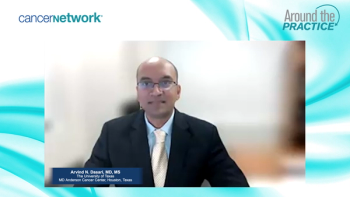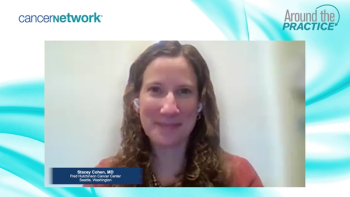
Panelists offer concluding perspectives on the future role of circulating tumor DNA in colorectal cancer management.

Your AI-Trained Oncology Knowledge Connection!


Panelists offer concluding perspectives on the future role of circulating tumor DNA in colorectal cancer management.

Medical professionals analyze gaps in current colorectal cancer patient care, with a focus on minimal residual disease testing.

The panel examines challenges in interpreting circulating tumor DNA results and their impact on clinical decision-making processes.

Medical professionals explore methods for integrating circulating tumor DNA results with radiographic and pathologic findings to optimize patient care.

The panel examines a clinical scenario, detailing their approach to circulating tumor DNA testing, including turnaround times, and providing insights on patient counseling.

Panelists analyze observed obstacles to implementing routine circulating tumor DNA testing as a standard of care, while offering strategies to overcome these challenges.

Panelists explore the clinical value of circulating tumor DNA testing at various stages of the colorectal cancer treatment journey, with a focus on optimal testing timelines.

Key opinion leaders evaluate the selection of available assays and platforms in relation to specific clinical objectives.

Medical experts examine how recent data on circulating tumor DNA-based minimal residual disease testing may impact the clinical management and treatment of colorectal cancer.

Key opinion leaders analyze recent findings from the BESPOKE study.

The panel examines recent studies from the INTERCEPT program investigating the utility of circulating tumor DNA (ctDNA) for minimal residual disease (MRD) detection in colorectal cancer (CRC).

The key opinion leaders share their approaches for communicating about circulating tumor DNA and minimal residual disease to patients, emphasizing the significance of ctDNA testing in detecting MRD.

Experts outline circulating tumor (ct) DNA analysis, detailing the two main techniques and their respective advantages and disadvantages.

Arvind Dasari, MD, MS, outlines the evolution of colorectal cancer screening, addressing historical challenges, and the development of non-invasive screening techniques.

Leading experts offer insights into colorectal cancer, including its prevalence, staging, and the current landscape of treatment options.

The expert panel concludes its discussion with a focus on the future of MRD testing in colorectal cancer, highlighting the treatment landscape’s current strengths and challenges.

Focusing on the BESPOKE CRC study, John H. Strickler, MD, reviews recent updates presented at ASGO GI 2024 and discusses subset analyses from the trial.

An overview of the rationale and study design of the INTERCEPT study in patients with colorectal cancer, with a focus on the early key findings.

Arvind N. Dasari, MD, MS, presents the third patient profile of the discussion, a 62-year-old woman with colon cancer, highlighting the role of MRD testing in guiding treatment decisions in the surveillance setting.

Stacey Cohen, MD, reviews the initial results from the phase 2 COBRA study focused on ctDNA as a predictive biomarker in adjuvant chemotherapy for patients with stage II colon cancer.

Arvind N. Dasari, MD, MS, gives an overview of the rationale and study design of the phase 2/3 CIRCULATE-NORTH AMERICA clinical trial.

Experts on colorectal cancer provide comprehensive insights on the GALAXY study, highlighting key updates that were presented at ASCO GI 2024.

Aparna Parikh, MD, reviews the DYNAMIC trial, which is focused on ctDNA-guided adjuvant therapy in early-stage colorectal cancer.

Stacey Cohen, MD, presents the case of a 39-year-old woman with high-risk stage II colorectal cancer, highlighting how ctDNA helped inform treatment selection.

The expert panel provides a comprehensive overview of the COSMOS-CRC-03 study and touch on the importance of also looking at real-world data.

An overview of prospective trial data surrounding MRD testing in early-stage CRC and the impact of these findings on the overall treatment landscape.

Michael Foote, MD, presents the case of a 50-year-old man with stage III colorectal cancer, highlighting the role of MRD testing in patient monitoring and treatment management.

GI medical oncologists discuss MRD testing practices in colorectal cancer and provide insights on challenges associated with testing.

Arvind N. Dasari, MD, MS, provides clinical insights on MRD testing modalities, highlighting factors that inform the decision on which platform to use in practice.

A panel of medical oncologists introduce themselves and provide an overview of circulating tumor DNA (ctDNA) and how it relates to MRD (minimal residual disease) testing in colorectal cancer (CRC).

Published: April 24th 2023 | Updated:

Published: July 4th 2024 | Updated:

Published: July 18th 2024 | Updated:

Published: July 11th 2024 | Updated:

Published: May 22nd 2023 | Updated:

Published: October 14th 2022 | Updated: